- Home
- Elmore Leonard
Valdez Is Coming: A Novel Page 9
Valdez Is Coming: A Novel Read online
Page 9
The clerk from the Republic Hotel, as soon as he was off duty, went over to De Spain’s and asked if the three Tanner riders had been there.
Hell, yes, they had. They’d been here and to Bob Valdez’s boardinghouse and the Hatch and Hodges office and had stuck their heads into almost every store along the street. They moved fast and didn’t waste any questions and you could tell they wanted him bad. Bad? Did you see the sign out in front? Nailed to the post?
It was a square of board, and one of them had lettered on it with charcoal: BOB VALDEZ IS A DEAD MAN. ANYONE HELPING HIM IS ALSO DEAD.
That was how bad they wanted him. They were going to kill him.
If they ever found him. Where the hell was Valdez? Nobody knew. Nobody remembered seeing him in days. The last time was Saturday when he rode out to see Tanner. No, somebody said, he had made the run to St. David the next day. How about since then? Nobody could recall. Maybe he’d been around; maybe he hadn’t. Bob Valdez wasn’t somebody who stuck in your mind and you remembered.
Mr. Malson said to Mr. Beaudry, “If he’s got Tanner on him and knows it, he’ll be seven hundred miles away by now.” “Or farther,” Mr. Beaudry said. “If he don’t know it,” somebody said, “then he’s a dead man, like the sign says.” “There must be something wrong with his head,” Mr. Malson said. “Christ, we should have known it the minute he started talking about the Lipan woman something was wrong with him.”
R. L. Davis didn’t say anything. He wanted to, but he still wasn’t sure what people would say. They might say he was crazy. If he’d pushed Valdez over in the sun, then what had he gone back for?
They’d listen to him tell it. “Sure, I pushed him over. I was teaching him a lesson for coming at me with the scatter gun the other day—after he shot the nigger.” They’d look at him and say, “You killed a man like that? Like a Indin would do it?”
And he’d say “No, I was teaching him a lesson is all. Hell, I went back and cut him loose and left him a canteen of water.” And they’d say, “Well, if you cut him loose, where is he?” Somebody else’d say, “If you wanted to kill him, what did you cut him loose for?”
And he’d say, “Hell, if there’s something between me and Bob Valdez, we’ll settle it with guns. I’m no goddam Apache.”
But he had a feeling they wouldn’t believe a word of it.
All right, three days ago he’d left Valdez in the meadow. And this evening Tanner’s men come in looking for him and write his death sentence. So Valdez must have gone back and done something to them.
Valdez hadn’t been here; at least nobody remembered seeing him. So where would he have been the past three days? Not at his boardinghouse.
But, goddam, Diego Luz had been to his boardinghouse! He could see Diego again coming out of it and the funny look on the man’s face when he realized he’d been spotted.
What would Frank Tanner say about that? R. L. Davis said to himself. If you could hand him Bob Valdez he’d hire you the same minute, wouldn’t he?
Go up to Tanner and cock the Walker in his face and say, All right, give me the money, Valdez was thinking. Not asking him, telling him this time. A hundred dollars or five hundred or whatever he had. Take it and get out and don’t think about later until later. He would have to leave Lanoria and go someplace else and maybe worry about Tanner the rest of his life—because he had wanted to help the woman; because he had started it and gotten into it and now was so far in he couldn’t turn around and walk out. You must be crazy, Valdez thought. Like Inez had said. Or an idiot. But he was here and was going through with it and he wasn’t going to think about why he was here.
He was behind the church, bringing the buckskin along close to the wall, then into the alley that led to the yard of the church. At the far end of the yard was the building with the loading platform. Past the low wall of the churchyard he could see the square and the water pump and stone trough. There was no one in the square now. Farther down the street, in the dusk, he could make out people in front of the adobes, a few of the women sitting outside to talk; he could hear voices and laughter, the sound clear in the silence.
Valdez left the buckskin in the yard. He went over the wall and through the narrow space between the platform and two freight wagons that stood ready for loading. He mounted the steps at the far end. On the platform he looked out at the square again and at the church doorway and the fence across the opening. There were a few horses inside; he wondered if one of them was his claybank. Maybe after, he would have time to look. He crossed the platform and went into the building, into the room crowded with wooden cases and sacks of grain. Maybe this wasn’t Tanner’s place. Maybe he would have to work his way down the street, hurrying before it was full dark and they gave up looking for him. It was already dark in the room. He had to feel his way at first, moving between the cases to the stairway. The boards creaked and his boots on the stairs made a hard, sharp sound that Tanner would hear if he was upstairs; he would be ready or he would think it was one of his men. Valdez reached the hall and opened the door in front of him.
The room was still and seemed empty, until the woman moved and he saw her profile and the soft curve of her hair against the window. She watched him cross the room and open the door to the bedroom, waiting for him to look toward her again.
“He’s not here.”
Valdez walked toward her. He stopped to look out the window at the square below. “He went with them?”
“I guess he did,” the woman said. “He didn’t say.”
“Are you his wife?”
She didn’t answer for a moment, and Valdez looked at her.
“I will be his wife, soon.”
“Do you know him?”
“That’s a strange question. I guess I know him if I’m going to marry him.”
“Well, it’s up to you.”
There was a silence between them until she said, “Are you going to wait for him?”
“I don’t know yet—wait or come back another time.”
“He won’t give you another time. You killed one of his men.”
“He died. I thought he would die,” Valdez said. “Unless you had a doctor.”
She watched him look out the window again. “Did you come here to kill Frank?”
“It would be up to him,” Valdez said.
“Then what do you want?”
“The same thing as before. Something for the woman.”
“Why? I mean why do you bother?”
“Listen,” Valdez said. He hesitated. “If I tell you what I think, it doesn’t sound right. It’s something I know. You understand that?”
“Maybe you’ll kill him,” the woman said, “but you won’t get anything out of him.”
Valdez nodded slowly. “I’ve been thinking of that. If he doesn’t want to give me anything, how do I make him? I push a gun into him and tell him, but if I have to shoot him, then I don’t get anything.”
“If he doesn’t kill you first,” the woman said.
“I’ve been thinking,” Valdez said. “If I have something he wants, then maybe we make a trade. If he wants it bad enough.”
She watched him and said nothing. He was looking at her now.
“Like I say to him, ‘You give me the money and I give you your woman.’ ”
She continued to look at him, studying him. “And if he doesn’t give you the money?” she said finally.
“Then he doesn’t get his woman,” Valdez said.
“You’d kill me?”
“No, the question would be how much does he like you?”
“He’ll outwait you. He’ll put his men around the building and sooner or later you’ll have to go out.”
“Not if I’m already out,” Valdez said. His face went to the window before he looked at her again. “Listen, if you want to take something with you, get it now.”
A woman who belonged to one of Tanner’s men saw them leave. She had gone to the water pump in the square and stood looking at them as they came out to the loading pl
atform: the woman of Mr. Tanner with a blanket roll and the man carrying a grain pack with something in it and an empty water skin. She looked at them and they looked at her, but she didn’t call out. She told Mr. Tanner she was afraid the man would do something to her or to the woman of Mr. Tanner.
“Go on,” Tanner said. “Then what?” He was still mounted, standing with his segundo and several of his men in the lantern glow of the square—the lantern on the seat of a freight wagon so Tanner could see the woman while she told what had happened.
“They went to the yard of the church,” the woman said to Tanner. Then the man came over the wall toward her and told her to get a horse from the church, asking for a particular claybank horse if it was there. The woman brought out a horse but was not sure of its color in the darkness of the church and it wasn’t the claybank but a brown horse. Then he told her to bring a saddle and bridle and a half sack of dried corn.
While this was taking place, the woman of Mr. Tanner was astride a horse in the churchyard, sitting in the saddle as a man does, though she was wearing a dress. “I think a white or a gray dress,” the woman said. When Valdez was ready and had mounted the brown horse, he rode into the churchyard and told the woman of Mr. Tanner to follow him.
“Did she say anything to him?” Tanner asked.
“Not that I heard,” the woman said.
They left through the alley next to the church. The woman waited until they were in the alley and followed, but by the time she reached the back of the church they were gone.
“Could you hear them?” Tanner asked.
“I think going toward the river,” the woman said.
“To reach cover,” the segundo said. He was sitting his horse close to Frank Tanner. “Then maybe south into the mountains.”
“How long ago?” asked Tanner.
The woman thought about it and said, “Not long. They would be maybe two or three miles away only. Or a little more if they ran their horses.”
“You know what to do,” Tanner said to the segundo. “Whoever’s here, send them out again.”
“In the dark,” the segundo said, “how do we see them?”
“You listen,” Tanner said. “Somebody could run into them.”
The segundo waited, about to speak, but looked at Tanner and then only nodded. It was Tanner’s business. No, his business was in the morning with the arms and grain and cattle, taking it all across the border and coming back without being killed. That was his business.
But in the morning the freight wagons stood empty, and Frank Tanner waited on the loading platform for his men to come in. Some of the women stood in the square, watching him, waiting to see what he was going to do. The men came in singly and in small groups and would talk to the segundo while they watered their horses and while the women watched. It was almost midmorning when the three trackers came in. One of them was dead, the other two were wounded.
These three who came along the street single file, one of them facedown over his saddle, were the segundo’s best hunters and trackers. They had been in the Army and had lived through the campaigns against the Apache. But now one was dead and another would soon be dead.
Tanner sat in a rocking chair in the morning sunlight and watched them brought in: another dead man on the loading platform and a man coughing blood and a third one, luckier than the first two, shot through the left forearm, the bone shattered, and there was no doubt about that. This one could talk and he told what had happened, his the only voice in the stillness. Tanner listened to the man and did not interrupt. He heard how the three had put themselves in Valdez’s place and decided he would follow the river south into the hills of the Santa Ritas, then maybe work his way west around toward Lanoria or maybe not, but they’d take a look.
With the first light this morning they had found tracks, fresh prints of two horses that showed the horses were walking. They weren’t sure of this man they were following; he didn’t try to keep to rocky ground or cover his tracks, and he walked the horses, maybe thinking he had enough time. Still, when they came to the flat open stretch with the trees in the distance, they were careful, knowing he could be waiting for them in the trees. So they made a plan as they crossed the flat stretch: they would spread out before they got to the cover and come up from three sides and if he was in there they’d have him. But they never got to the trees.
“Listen, it was flat open,” the man with the shattered arm said, “out to the sides as far as you could see and a mile in front of us. There was no cover near, hardly any brush to speak of. So it was like he rose up out of the ground behind us. He says, ‘Throw down your guns and come around.’ This voice out there in the middle of nothing. We stop and come around, keeping our iron though, and there he is standing there. I swear to God there was nothing for him to hide behind, yet we’d come over the ground he was standing on just a moment before.
“He says, ‘Go back and tell Mr. Tanner we’re waiting for him.’ That’s what he said, waiting for him. Meaning he wasn’t talking to anybody else. Then he says, ‘Tell Mr. Tanner I got something to trade him.’ We looked, but she wasn’t anywheres around. Just him, and three of us. I guess we all had it in mind to bust him and he must have saw it. He says again, ‘Throw down the guns.’ We don’t move. He says it again and this time when we don’t move he brings up the Colt gun in his right hand and puts one through my arm.”
He looked toward the dead man and the man who was lying on the ground shot through the lungs. “They went for theirs with the sound of his piece, and he brings up this little scatter gun in his left hand and lets go both barrels and them two boys take it square. This here boy partly in front of the other, a little closer, and it killed him in his boots.
“Then he says to me, ‘You tell him, he wants his woman, come out here with five hundred dollars.’
“I say to him, ‘Well, where’s Mr. Tanner supposed to come? You going to have signs put up?’ And then he points.”
The man with the shattered arm, standing by the loading platform, turned half around and raised his right arm, his finger extended; he moved it gradually southwest.
“There, you can see it,” the man said, “though it was closer where we were at and you could see it better—twin peaks, the one a little higher than the other. He says for you to point to them and he’ll get in touch with you.
“I say to him, ‘Well, what if Mr. Tanner don’t feel like coming?’
“And he says, standing there with the shotgun and the Colt gun, ‘Then I kill his woman.’ ”
Frank Tanner stared at the twin peaks ten miles in the distance. After a few minutes, when he became aware that he was sitting in a rocking chair on the loading platform and his people were below him in the square, waiting for him to say something, he waved his hand and they cleared out, taking the dead man and the lung-shot man and the man with the shattered left arm, who thought Mr. Tanner might say something to him personally. But he didn’t—just the wave of the hand.
The segundo stayed; he was the only one. He waited awhile, getting the words straight in his mind. When he was ready he said, “You go after him, we don’t make the trip.”
He waited, giving Mr. Tanner a chance to say something, but the only sound was someone working the pump handle, a rattly metal sound in the heat settling over the village.
“We go out there and look for him,” the segundo said. “Sure, we find him, but maybe it take us a few days, a week, if he knows what he’s doing. We’re out there, we’re not in Sonora giving the man the things he’s paying for. How much is he paying?” The segundo waited again. He said then, “He pay plenty, but nobody pay you to go up in those mountains.”
The segundo stood in the sun waiting for Mr. Tanner to say something. He could stand here all day and this son of a bitch Mr. Tanner might never say anything. The segundo was hot and thirsty. He’d like a nice glass of mescal and some meat and peppers, but he was standing here waiting for this son of a bitch Americano to make up his mind.
So he
said, smiling a little, “Hey, what if you don’t go out? You let him kill her.” His smile broadened and he gestured as if to say, Do you see how simple it is? He said, “Then what? You get another woman.”
Frank Tanner, sitting in the rocker, looked at his segundo. He said, “If you were up here I’d bust your face open. And if you wanted any more I’d give you that too. Do you see the way it is?”
The segundo had killed five men in his life that he knew of and had probably killed more if some of them died later or if he wanted to count Apaches. He had hanged a man he caught stealing his horses. He had killed a man with a knife in a cantina. He had shot a man who once worked for him and insulted him and drew his revolver. He had killed two Federales when the soldiers set an ambush to take the goods they were delivering in Sonora. And with others he had wiped out an Apache ranchería, shooting or knifing every living person they found, including the old people and the children. But the segundo was also a practical man. He had a wife in this village and two or three more wives in villages south of here, in Sonoita and Naco and Nogales. He had nine children that he knew of. Maybe he had eleven or twelve. Maybe he had fifteen. He had not wanted to kill the Apache children, but they were Apache. He also liked mescal and good horses and accurate rifles and revolving pistols. He was number two and Mr. Tanner was number one. He was thinking, Shit. But he smiled at Mr. Tanner and said, “Why didn’t you say so? You want to get this man, we go get him for you.”
Frank Tanner nodded, thinking about the woman.
The time he was in Yuma he thought about women every day. He’d thought about women before that, but not the same way he did in that stone prison overlooking the river. He remembered how the men smelled at Yuma, breaking rocks for twelve hours in the sun, working on the road, and coming back in to eat the slop. That’s when they’d start talking about women. Frank Tanner would think, They don’t know a real woman if they see one, except for some whore who’d smile and laugh and give them everything and rot their insides. No, when he was at Yuma he pictured a blond-haired girl, real long hair and a pretty face and big round breasts, though she wouldn’t be too big in the gut or the hips. The hips could be more than a handful, but she’d have to have a nice sucked-in white gut. That’s the one he pictured at Yuma, after he and Carlisle Baylor got caught with the goddam branded cows they were running into old Mexico without any bill of sale. Three years picturing the blond golden-haired woman. Two years more raising money and buying stock to sell across the border, buying and selling horses and cattle and dynamite and about anything he could lay his hands on they didn’t have down there. He’d bought twenty-five-year-old Confederate muskets and sold them. He bought a few old Whitworth field pieces and sold them too. He’d made money and met people who knew people and pretty soon he was even selling remounts to the United States Cavalry at Fort Huachuca. And that was where he saw the woman, the girl or woman or however you wanted to think of her, there at Huachuca, married to the drunk-ass sutler, who never went a day without a quart of whiskey or a bottle of mescal or even corn beer if he couldn’t get any mescal. There she was, the one he’d seen every day at Yuma and about every day since, the blond golden-haired girl who was built for the kind of man he was, sitting in their place talking to the drunk-ass sutler and looking at the woman every chance he got. A year of that; a little more than a year. Talking to her when he wasn’t around and trying to find out things about her, about them. Trying to find out if she felt anything for the drunk or not. She felt something when he beat her—sometimes you could see the bruises on her face she couldn’t hide with powder—but maybe she liked it. You could never tell about women.

 Charlie Martz and Other Stories: The Unpublished Stories
Charlie Martz and Other Stories: The Unpublished Stories Elmore Leonard's Western Roundup #2
Elmore Leonard's Western Roundup #2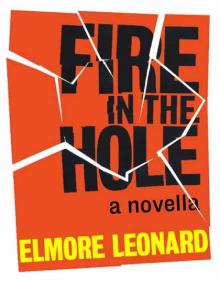 Fire in the Hole
Fire in the Hole Tishomingo Blues (2002)
Tishomingo Blues (2002)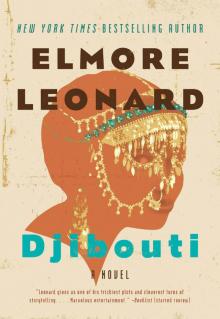 Djibouti
Djibouti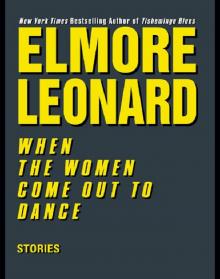 When the Women Come Out to Dance: Stories
When the Women Come Out to Dance: Stories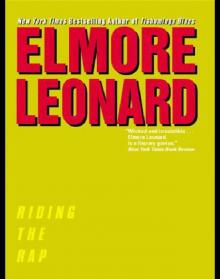 Riding the Rap
Riding the Rap Moment of Vengeance and Other Stories
Moment of Vengeance and Other Stories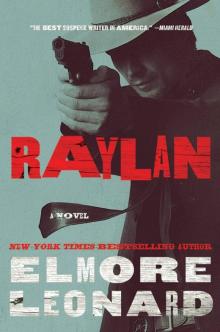 Raylan
Raylan Touch
Touch Mr Majestyk
Mr Majestyk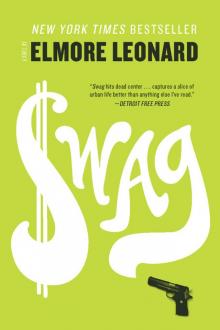 Swag
Swag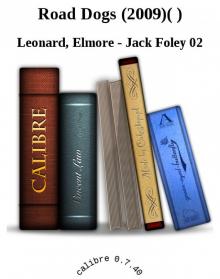 Road Dogs
Road Dogs La Brava
La Brava The Hot Kid
The Hot Kid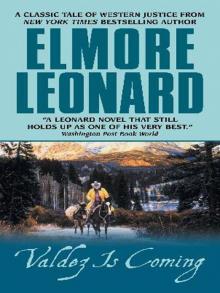 Valdez Is Coming: A Novel
Valdez Is Coming: A Novel Be Cool
Be Cool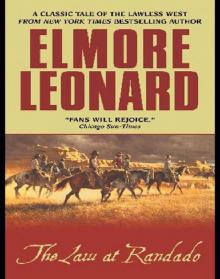 The Law at Randado
The Law at Randado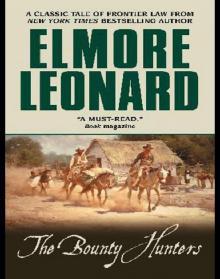 The Bounty Hunters
The Bounty Hunters When the Women Come Out to Dance
When the Women Come Out to Dance 310 to Yuma and Other Stories (1953)
310 to Yuma and Other Stories (1953)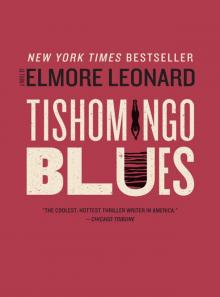 Tishomingo Blues
Tishomingo Blues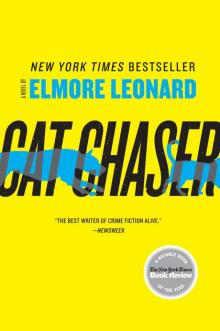 Cat Chaser
Cat Chaser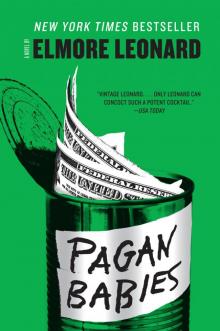 Pagan Babies
Pagan Babies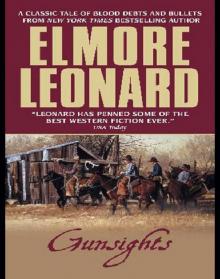 Elmore Leonard's Western Roundup #1
Elmore Leonard's Western Roundup #1 52 Pickup
52 Pickup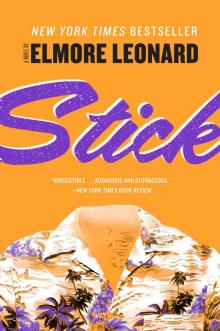 Stick
Stick The Moonshine War
The Moonshine War Valdez Is Coming
Valdez Is Coming City Primeval
City Primeval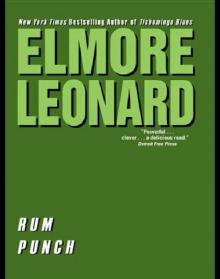 Rum Punch
Rum Punch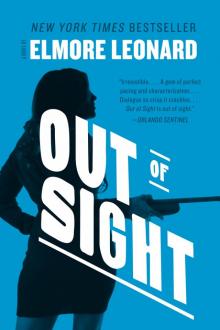 Out of Sight
Out of Sight Naked Came the Manatee (1996)
Naked Came the Manatee (1996)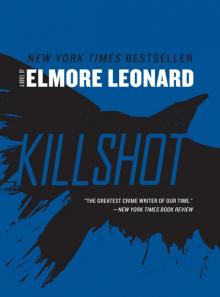 Killshot
Killshot Cuba Libre
Cuba Libre Forty Lashes Less One
Forty Lashes Less One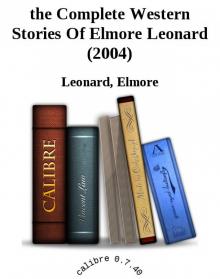 The Complete Western Stories of Elmore Leonard
The Complete Western Stories of Elmore Leonard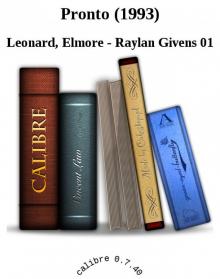 Pronto
Pronto Split Images
Split Images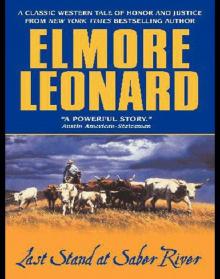 Last Stand at Saber River
Last Stand at Saber River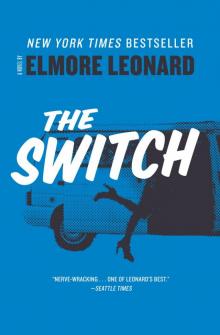 The Switch
The Switch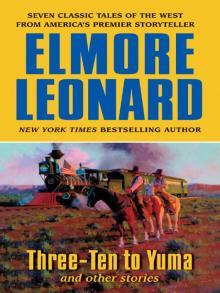 Three-Ten to Yuma and Other Stories
Three-Ten to Yuma and Other Stories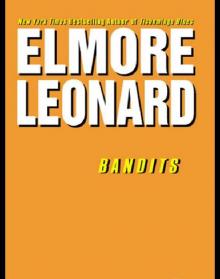 Bandits
Bandits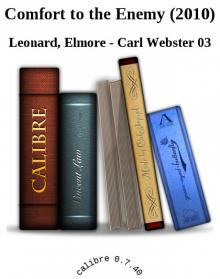 Comfort to the Enemy and Other Carl Webster Stories
Comfort to the Enemy and Other Carl Webster Stories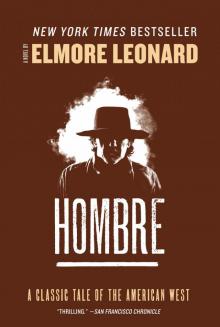 Hombre
Hombre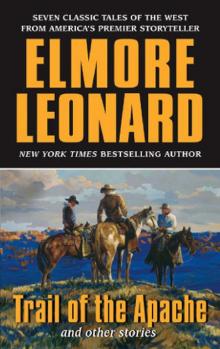 Trail of the Apache and Other Stories
Trail of the Apache and Other Stories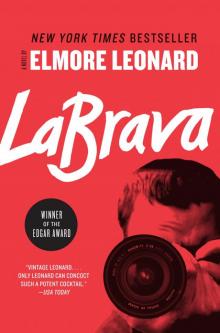 LaBrava
LaBrava Gold Coast
Gold Coast Jackie Brown
Jackie Brown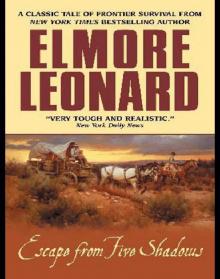 Escape From Five Shadows
Escape From Five Shadows Karen Makes out (1996)
Karen Makes out (1996)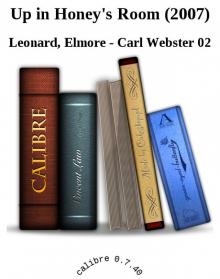 Up in Honey's Room
Up in Honey's Room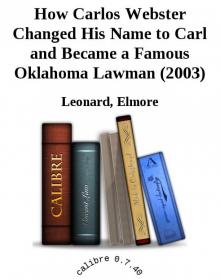 How Carlos Webster Changed His Name to Carl and Became a Famous Oklahoma Lawman (2003)
How Carlos Webster Changed His Name to Carl and Became a Famous Oklahoma Lawman (2003)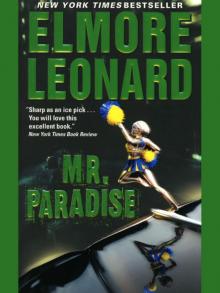 Mr. Paradise
Mr. Paradise The Hunted
The Hunted Freaky Deaky
Freaky Deaky Louly and Pretty Boy (Ss)
Louly and Pretty Boy (Ss)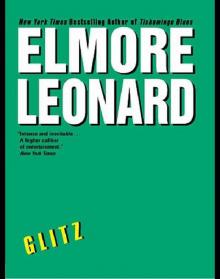 Glitz
Glitz A Coyote's in the House
A Coyote's in the House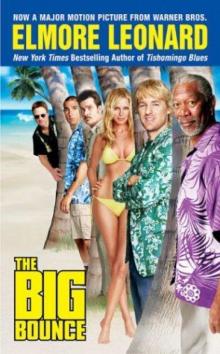 The Big Bounce jr-1
The Big Bounce jr-1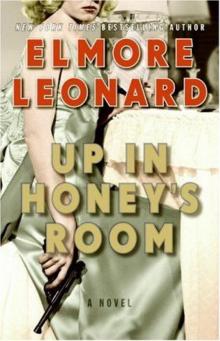 Up in Honey's Room cw-2
Up in Honey's Room cw-2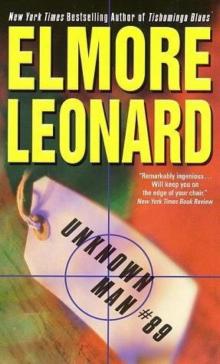 Unknown Man #89 jr-3
Unknown Man #89 jr-3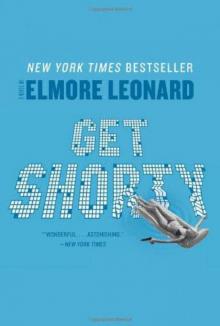 Get Shorty: A Novel cp-1
Get Shorty: A Novel cp-1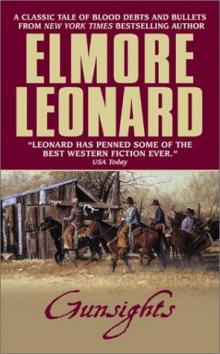 Gunsights
Gunsights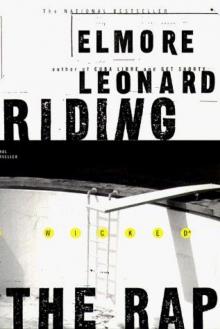 Riding the Rap rg-2
Riding the Rap rg-2